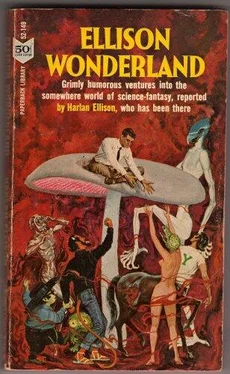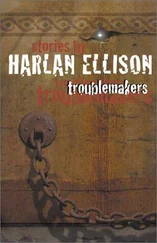The inevitability factor was a result of live tri-vid, and the insatiable appetite for novelty of the vid audience. If vid broadcasts came from Bermuda in tri-vid color with feelie and whiff, then they wanted wide-band transmission from the heart of the Sudetenland. If they got that, it wasn’t enough; next they wanted programs from the top of Everest. And when they had accomplished that—God only knows how—the voracious idiot mind of the audiences demanded more. They demanded live casts from the Millstone, circling above the Earth; then it was Lunar fantasics with authentic settings…and Mars…and Venus…and the Outer Cold Ones.
Finally, Leon Packett stumbled upon the secret of a perfect, self-contained tri-vid camera, operating off a minute force-bead generator; and in his warped way, he struck instantly to the truth of the problem—that the only camera that could penetrate to those inner niches of the universe that the eyes of man demanded to glimpse, was a man himself.
How completely simple it was. The only gatherer of facts as seen by the eyes of a man…were the eyes of a man. But since no man would volunteer to have his head sliced open, his brains scooped out, and a tri-vid camera inserted, Leon Packett invented Walkaway. In all due to the devil, it was coldly logical, and it was a beautiful bit of workmanship. Walkaway had the form of a human being, even to ball-and-socket joints at the knees and elbows. He stood just under seven feet tall, and his hide was a burnished permanodized alumasteel suit. His hands could be screwed off, and in their stead could be inserted anyone of three dozen “duty” hands, withdrawn from storage crypts, located in the limbs. His head was the only part of him that was slightly more than human. Brilliantly so, again offering Satan his plaudits.
Where the center of the face on a human would have been, the revolving lens wheel with its five turrets bulked strangely. Beneath the lens wheel a full-range audio grid lay with criss-crossed strangeness. The audio pickups were located on either side, as well as front and rear, of the head.
Two sets of controls were used on Walkaway. One set was imbedded in the right arm (and would snap up at the proper coded pressing of a lock-snit at the wrist) and was chiefly used by Walkaway himself when he was asked to play back what he had heard or seen.
The other console controls were in the back, and to my knowledge, were never employed after Walkaway’s initial test runs. He disliked being pawed.
Naturally, the dissenters at Walkaway’s birth, who declaimed the sanity of giving a robot volition and “conscience” with as much strength as his metal frame held, were shouted down. The creature—well, wasn’t he?—had to have the right of free choice, if he was going to get the story in all its fullness and with a modicum of imagination, which the vid audience demanded.
So Walkaway was made more human.
He was able to disagree, to be surprised, to follow instructions almost as they were given, and to select the viewing subjects he wished, when he was filming. Walkaway was a most remarkable…what?
Creature.
“Leon, you’ve got to do it. Don’t be obstinate, that’s just being foolish. They’ll get him somehow, Leon!”
Leon Packett spun in the chair, facing the window. His back was very straight, and his neck held a rigid aloofness. “Get out, McCollum. Get out and tell your pony-soldiers to do the same. Leave me alone!”
Alan McCollum threw up his hands in eloquent frustration. “Lee, I’m trying to get through to you, for God’s sake! All I ask is you listen to them, and then make a decision—”
Packett spun in the chair. His feet hit the floor with a resounding clump and he leaned one elbowed arm at McCollum. His index finger was an unwavering spear, the tip of which aimed between McCollum’s sensitive dark brown eyes.
“Now look, McCollum. I spent fifteen years in a cellar lab, working what I could, and experimenting as best I could, soldering old pieces together because I couldn’t get a Frericks Grant. Then I happened to think of putting two old gadgets together, and I came up with a miracle. Now I’m big time, and the Frericks Foundation uses me in their institutional advertisements.”
His lean, horsey face was becoming ruby-blotched.
“But Walkaway is mine, McCollum! Mine! I dreamed him up and I sweated constructing him. I starved for fifteen years, McCollum. Fifteen. You know how long that is? While you and all your MIT buddies were piddling around putting chrome on old discoveries, I was missing all the good things.”
McCollum’s jaws worked. His eyes dulled with suppressed fury. “That isn’t fair, Lee. You almost enjoy your misery, and you know it.”
Packett stood up. His face was a crimson and milk patchwork. “Get out!” he snarled. His thin lips worked loosely, and his nostrils flared. “Get out and leave me alone. Walkaway is not going to Carina. Not Epsilon Carinae, not Miaplacidus, nowhere in Carina. Walkaway is staying here, where I can keep getting my commissions, where I can guarantee my future. It’s been too dirty for me to start being patriotic now, McCollum, so you can trot out there and tell your Space Patrol buddies I’m not in the market.”
McCollum was about to shout an answer, but he stood up instead. Stood up and stared at the contorted features of Leon Packett.
He turned and took three steps to the slidoor. With his palm—but not fingertips—fitted into the depression, he paused, and looked back at Packett. “There are doctors who can help you, Leon.”
“Get out, you sonofabitch!”
A heavy plastex ashtray crashed into the wall beside McCollum’s head. His fingertips touched and the door slid.
Perhaps he knew it was inevitable. The machinery he had always despised, now ground its wishes out in the dust of his ambitions. He had suffered by his own hand, and had cursed the powers that had overlooked him. But now they wanted his vid-robot, his Walkaway. He knew they would reimburse him handsomely, but that was not what he sought.
Packett knew, and he moved to preserve his will, despite the loss of his invention. Late into the night he worked, on the smallest, most unnoticeable alterations in the printed circuitry of Walkaway’s “mind” and “conscience”. Late into the night on a space of plastex no larger than the surface of an eyeball. And when he fell into an exhausted sleep, as the daylight ribboned across the laboratory walls, Walkaway stood as he had stood. Unchanged.
Apparently.
But changed.
Inwardly.
He managed to salvage his old age. By the simple expedient of refusing to allow ownership to switch from his hands—and after his death the hands of the Frericks Foundation—into the hands of the military, he preserved a hold on Walkaway. The Guard—his terminology “Space Patrol” had long since been aborted, despite the tabloid’s efforts to keep it alive—were forced to hire Walkaway. They signed him on as a civilian employee, paid a monthly wage, a per diem remuneration, as well as travel expenses.
The wages were to be paid on demand, and books were kept by the Frericks Foundation, whose interest in Packett and Walkaway were more than merely scientific. With the world-famous Leon Packett associated with them, there could be no doubt about doles and grants. The Frericks Foundation had men at its helm whose interests penetrated into other fields than scientific: politics, finance, authority. The men were exceedingly careful to keep books.
The Guard’s first enterprise in which Walkaway figured prominently was the remote from Bounce Point.
Bounce Point was the super-satellite constructed out beyond Pluto. It had been thrown up as the last outpost of Solar enterprise. Man’s final touch with what was known, before he leaped off into the unknown.
Читать дальше












